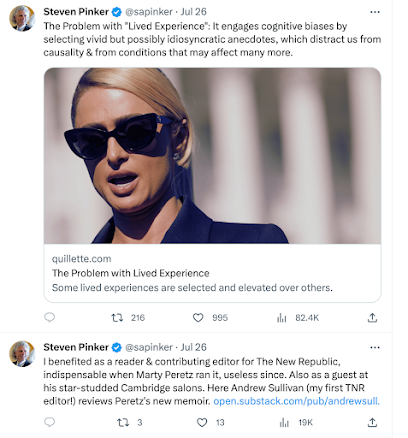Presumably it will share info eventually, as it has done for its previous conferences, but I expect well after the conference has ended.
Steven Pinker was scheduled to speak at the Racist Rodeo yesterday, but he has had nothing to say about the ISIR on Twitter so far.
Meanwhile Pinker was promoting racist garbage-rag Thiel-funded Quillette.
One of the co-authors of the piece he is promoting is Naomi Schaefer Riley, a senior fellow at the Koch-funded AEI.
Does Steven Pinker ever associate with anything or anybody that is NOT connected to race pseudoscience or the far-right plutocracy?
Meanwhile, the Twitter account for ISIR has been inactive since 2020, most recently retweeting something from Abdel Abdellaoui.
Demonstrating that while Abdellaoui may detest Emil Kirkegaard, he is still firmly on the side of race pseudoscience.
Not that I needed more evidence, he's a friend of Razib Khan, according to Khan.
Kirkegaard holds exactly the same pseudoscientific beliefs as Khan, so I guess Abdellaoui's real problem with Kirkegaard is that Kirkegaard doesn't have the right credentials and he's more blatant about his racism. I'm sure Kirkegaard and Khan agree that Black Americans, thanks to their genes, are an existential threat to the United States - but Khan manages to express that belief indirectly - by praising Charles Murray for the same beliefs. And we know how much Charles Murray agrees with Emil Kirkegaard.
Murray is not subtle about how he would like to see social policy adjusted to reflect his pseudoscientific beliefs in Black inferiority.
By the way, that is Francis Galton, notorious racist, the founder of contemporary race pseudoscience, eugenics and behavioral genetics chosen by ISIR as the avatar for their Twitter account.
ISIR loves to flaunt its connection to racists.
Anyway, until more information is available about the 2023 Racist Rodeo, let's talk about a leading light of the ISIR, beloved by David Lubinski and Emil Kirkegaard, Arthur Jensen.
As noted yesterday, Lubinski is currently one of the officers of the Institute of Mental Chronometry. Jensen was originally one of the officers and the organization used to be called The Institute for the Study of Educational Differences, which received money from the white nationalist Pioneer Fund.
And Lubinski wrote the obituary for Jensen for the American Psychological Association and right from the beginning notes Jensen's debt to racists going back to Galton:
His intellectual ancestry traces back through his mentor Hans Eysenck to Cyril Burt, Charles Spearman, and, ultimately, Sir Francis Galton.At the end of the first page of the obituary, Lubinski gets into the reason Jensen became famous:
Initially, Art wrote a chapter on how group differences in learning were likely traceable to deprivation– opportunity differences. Digging deeper into this literature, however, he was struck by how uncritically genetic influences were dismissed, and he began publishing articles on behavior genetics and individual differences in learning potential. His article “Social Class, Race, and Genetics: Implications for Education” (1968, American Journal of Educational Research [AJER]) attracted an invitation from the Harvard Educational Review to expand his treatment of the topic. The result, “How Much Can We Boost IQ and Scholastic Achievement?” (1969), questioned the efficacy of extant programs designed to enhance intellectual development and hypothesized that individual and group differences in learning potential have both genetic and environmental components. The article ignited a firestorm across academe, the popular press, and the Berkeley campus.His suggestion that genetic differences give rise to important psychological differences was anathema to prevailing academic ideology, but he also hypothesized that if traits run in families because of genes, they may also run in families of families (races) for the same reason...
...was arguably the father of modern day hereditarianism pseudoscience with the publication of an article in the Harvard Educational Review...
Jensen promoted eugenics as the only practical solution to the problems facing the black community, arguing that they lacked the intelligence necessary for compensatory education programs to be successful. His ability to repackage fringe racial theories in the dry, dispassionate rhetoric of science made Jensen an instant celebrity in white nationalist circles, where he is still revered as “an intellectual pioneer comparable to Nobel Prize winners” and “a man of the highest distinction, not just scientifically, but also morally.”
There are intelligence genes, which are found in populations in different proportions, somewhat like the distribution of blood types. The number of intelligence genes seems to be lower, over-all, in the black population than in the white. As to the effect of racial mixing, nobody has yet performed experiments that reveal its relative effect on I.Q. If the racial mixture weren’t there, it is possible that the I.Q. differences between blacks and whites would be even greater. I think such studies should be done to lay this uncertainty to rest once and for all.”
—Quoted in “jensenism, n. The theory that I.Q. is largely determined by the genes,” The New York Times Magazine, 1969
David Lubinski was about 16 in 1969. The fight for civil rights for Black Americans is well within living memory. And the promotion of Jensen and his fellow racialists as "science" in 1969 shows how quickly the backlash came.
When asked how he withstood the assaults, Art replied that he tried to live by Gandhi’s principle of correspondence between inner thoughts and public pronouncements.
Who were Jensen's friends in martyrdom and what was the organization of the London School of which he became the revered intellectual head? (The journal Intelligence recently devoted a Special Issue to him, calling him ‘A King among Men.’) What was the plan of campaign for dealing with the rise of political correctness which was making even discussion of race impossible? Miele's book has no index allowing tracing, but such crown princes of the London School as Phil Rushton (who first linked the Mongoloid–Caucasian–Negroid continuum to a wide range of psychological features, including sexuality – Rushton, 1985) and Richard Lynn (who first noticed evidence that Black African IQ was actually only 70 – Lynn, 1991) certainly do not loom large in Jensen's ‘conversation.’ Scrupulously aiming to avoid controversy, the man who first so sensationally attracted it now disdains any interesting propositions about the human condition. Jensen even says he does not feel either ‘inclined or properly qualified’ to think through the political implications of his work.
Jensen’s ability to hide this radical agenda from the wider public stemmed in large part from his reliance on abstruse jargon to mask the crude racism of his underlying arguments. To take one glaring example, in his 1973 book, Educability and Group Differences, Jensen claimed that “[t]he possibility of a biochemical connection between skin pigmentation and intelligence is not totally unlikely in the view of the biochemical relation between melanins, which are responsible for pigmentation, and some of the neural transmitter substances in the brain. The skin and the cerebral cortex both arise from the ectoderm in the development of the embryo and share some of the same biochemical processes.” Stripped of its scientific affectations, Jensen’s statement boils down to the claim that dark skin causes stupidity. No biologist would ever take such a statement seriously, and indeed, none has—though it is now a widely accepted belief among white supremacists.
While Jensen was generally savvy enough to avoid the overt racism of some of his colleagues, the mask did occasionally slip. In 1992, he gave an interview to the white nationalist American Renaissance magazine in which he laid out his beliefs about black people in plain language, without hiding behind obfuscatory jargon. In this interview, Jensen ridiculed people, including his own mother, who believe “that blacks would be no different from the rest of us — the rest of the population — if they simply had the same education and all of that.”
Much more thought and research should be given to the educational and social implications of these [dysgenic] trends for the future. Is there a danger that current welfare policies, unaided by eugenic foresight, could lead to the genetic enslavement of a substantial segment of our population?
Hereditarians are such true believers in genetic causation that they immediately jump from their speculations to dire warnings that public policy must be changed. I wrote about sociobiology hysteria a couple of years ago, first quoting Steven Pinker:
"Many misconceptions about behavior are harmless, but in these dangerous times some could lead to catastrophe. Steve Sailer's "The Cousin Marriage Conundrum" correctly predicts that it would be unwise to try to graft a political system onto a society without understanding how the psychology of kinship and ethnic identification plays out in the local environment."
So if we don't listen to Steve Sailer and his prediction, it could lead to "catastrophe."What is it about sociobiology that makes its proponents such drama queens? We've seen Razib Khan and Charles Murray say that if we don't accept the sociobiological view of Black Americans we "face disaster" and Kathryn Paige Harden, in her recent book, compared the refusal to accept the conclusions of "behavioral genetics" (basically sociobiology) with armed robbery.


